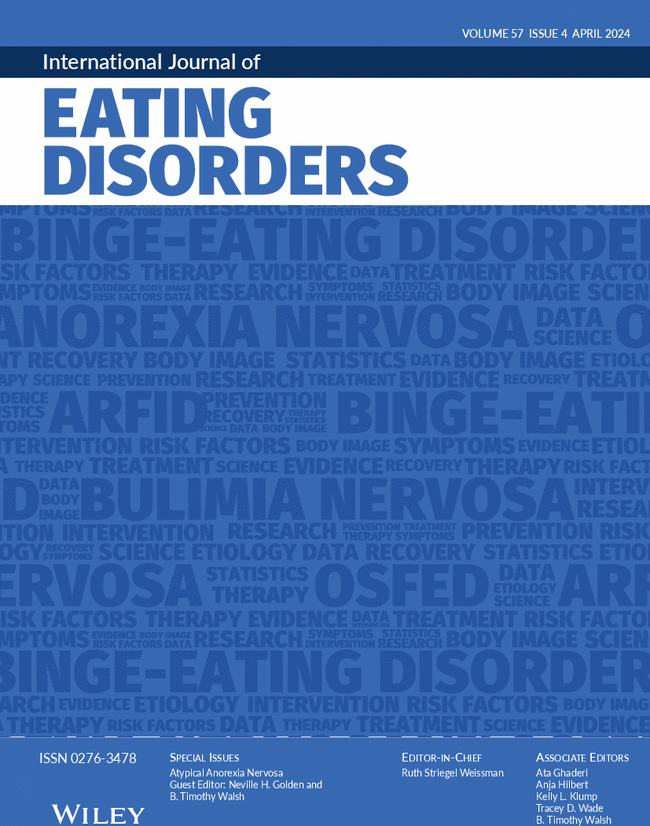Howard Steiger Ph.D., Stephen Stotland Ph.D., A. M. Ghadirian, Victor Whitehead
求助PDF
{"title":"Controlled study of eating concerns and psychopathological traits in relatives of eating-disordered probands: Do familial traits exist?","authors":"Howard Steiger Ph.D., Stephen Stotland Ph.D., A. M. Ghadirian, Victor Whitehead","doi":"10.1002/1098-108X(199509)18:2<107::AID-EAT2260180202>3.0.CO;2-1","DOIUrl":null,"url":null,"abstract":"<p>To examine the extent to which first-degree relatives of eating-disordered (ED) probands endorse maladaptive eating attitudes and personality/affective traits, we compared self-reported eating concerns (Restraint, Emotional Eating, Body Dissatisfaction, and maladaptive eating attitudes) and psychopathological traits (Affective Instability, Anxiousness, Compulsivity, and Narcissism) across groups of restricter (n = 19), binger (n = 56), psychiatric control (PC, n = 38), normal dieter (ND, n = 29), and nondieter control (NC, n = 28) probands, and then across participating nuclear family members. Results among probands were as anticipated: ED probands showed expected elevations in both areas, and predicted restricter/binger differences were obtained. However, corresponding differences were not obtained on measures of mothers', fathers', or siblings' eating concerns and traits. Our findings corroborate the notion that EDs represent a convergence of eating, affective, and personality disturbances, but not that such a clustering of features exists as a familial trait. We discuss normal trait and attitudinal variations observed in ED probands' relatives in light of findings showing EDs and other psychiatric syndromes to aggregate within families. © 1995 by John Wiley & Sons, Inc.</p>","PeriodicalId":51067,"journal":{"name":"International Journal of Eating Disorders","volume":"18 2","pages":"107-118"},"PeriodicalIF":4.3000,"publicationDate":"1995-09-01","publicationTypes":"Journal Article","fieldsOfStudy":null,"isOpenAccess":false,"openAccessPdf":"","citationCount":"52","resultStr":null,"platform":"Semanticscholar","paperid":null,"PeriodicalName":"International Journal of Eating Disorders","FirstCategoryId":"3","ListUrlMain":"https://onlinelibrary.wiley.com/doi/10.1002/1098-108X%28199509%2918%3A2%3C107%3A%3AAID-EAT2260180202%3E3.0.CO%3B2-1","RegionNum":2,"RegionCategory":"医学","ArticlePicture":[],"TitleCN":null,"AbstractTextCN":null,"PMCID":null,"EPubDate":"","PubModel":"","JCR":"Q1","JCRName":"NUTRITION & DIETETICS","Score":null,"Total":0}
引用次数: 52
引用
批量引用
Abstract
To examine the extent to which first-degree relatives of eating-disordered (ED) probands endorse maladaptive eating attitudes and personality/affective traits, we compared self-reported eating concerns (Restraint, Emotional Eating, Body Dissatisfaction, and maladaptive eating attitudes) and psychopathological traits (Affective Instability, Anxiousness, Compulsivity, and Narcissism) across groups of restricter (n = 19), binger (n = 56), psychiatric control (PC, n = 38), normal dieter (ND, n = 29), and nondieter control (NC, n = 28) probands, and then across participating nuclear family members. Results among probands were as anticipated: ED probands showed expected elevations in both areas, and predicted restricter/binger differences were obtained. However, corresponding differences were not obtained on measures of mothers', fathers', or siblings' eating concerns and traits. Our findings corroborate the notion that EDs represent a convergence of eating, affective, and personality disturbances, but not that such a clustering of features exists as a familial trait. We discuss normal trait and attitudinal variations observed in ED probands' relatives in light of findings showing EDs and other psychiatric syndromes to aggregate within families. © 1995 by John Wiley & Sons, Inc.
饮食失调先证者亲属饮食问题与精神病理特征的对照研究:家族特征存在吗?
为了检验进食障碍(ED)先证者的一级亲属在何种程度上支持适应不良的饮食态度和人格/情感特征,我们比较了自我报告的饮食问题(克制、情绪性饮食、身体不满和适应不良的饮食态度)和精神病理特征(情感不稳定、焦虑、强迫和自恋)在限制者(n = 19)、暴食者(n = 56)、精神控制者(PC, n = 38)、正常节食者(ND,n = 29)和非节食对照组(NC, n = 28)先证者,然后在参与的核心家庭成员中进行。先证者之间的结果如预期的那样:ED先证者在两个区域都显示出预期的升高,并且获得了预测的限制性/宾格性差异。然而,在母亲、父亲或兄弟姐妹的饮食问题和特征方面,没有得到相应的差异。我们的研究结果证实了EDs是饮食、情感和人格障碍的集合,但并不是这样的特征集群作为家族特征存在。我们讨论了在ED先证者亲属中观察到的正常特征和态度变化,根据研究结果显示ED和其他精神综合征在家庭中聚集。©1995 by John Wiley &儿子,Inc。
本文章由计算机程序翻译,如有差异,请以英文原文为准。

 求助内容:
求助内容: 应助结果提醒方式:
应助结果提醒方式:


